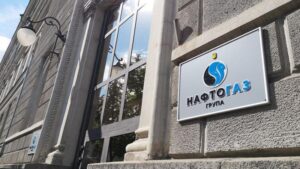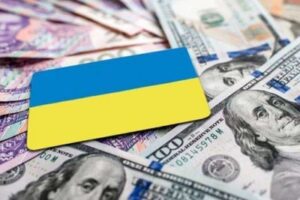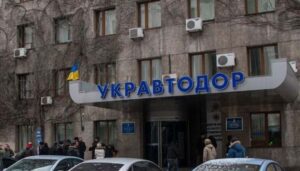
Naftogaz of Ukraine on Friday improved a month-old proposal to restructure Eurobonds it defaulted on last summer, with the main changes affecting bonds maturing in 2022.
According to the presentation on Naftogaz’s website, it is proposed to increase the interest rate on Eurobonds-2022 from the date of approval of the proposal from 7.375% to 7.65% per annum, and also around April 15, together with overdue interest pay 5% of the principal amount of debt.
At the same time, Naftogaz offers to defer the payment of 50% of the principal debt for two years – until July 19, 2024, and the remaining 50% – until July 19, 2025, while in February it proposed to repay the entire issue on July 19, 2024.
As for the postponement of the redemption of Eurobonds-2026, the proposal remained the same: 50% for one year, until November 8, 2027, and another 50% until November 8, 2028.
Payment of interest on Eurobonds-2022 due on January 19, 2023, July 19, 2023, and January 19, 2024 is proposed to be postponed until July 19, 2024. For Eurobonds-2026 from November 8, 2022, May 8, 2023, November 8, 2023 and May 8, 2024 to November 8, 2024.
“Naftogaz wants to reserve the right to both early repayment of the overdue ones and to capitalize them.

Mobile operator Vodafone Ukraine, part of NEQSOL Holding (Azerbaijan), has completed regular interest payments on its $12.4 million Eurobonds.
“Despite difficult operational and financial conditions related to the war, the company continues to service its debt in full,” the operator said in a press release Wednesday.
According to the release, the principal amount of the Eurobond debt is now $400 million, as the company has already repurchased and redeemed $100 million in bonds ahead of schedule.
As reported, in early February 2020, Vodafone Ukraine placed five-year $500 million Eurobonds at 6.2%. The 144A/Reg S issue was marketed to international investors in Europe and the US. The coupon on the eurobonds is paid semi-annually.

On December 12, companies related to the managers of Kernel agro-industrial group bought Eurobonds of the holding with a total par value of $12.4 mln at a price of 45-46% of the nominal value, Kernel said in a statement on the Warsaw Stock Exchange on Monday evening.
According to it, there were four transactions with Eurobonds maturing in 2024 and a coupon of 6.5% per annum: par value of $2.4 million at 45.75% of par value, par value of $2.5 million (at 46%), par value of $5 million (at 45%), par value of $2.5 million (at 45.55%).
It is specified in the message that deals were made at over-the-counter market.
As earlier reported, in the middle of November the companies, related to “Kernel” management, purchased Eurobonds of the holding with a total par value of $29,43 mln at a price of 45-48% of the nominal value.
According to the annual report of “Kernel” in the middle of this year in the market were eurobonds of the company with maturity in 2024 and the nominal value of $297,314 million with maturity in 2027 and $297,724 million.
“Kernel was the world’s number one producer and exporter of sunflower oil before the war (about 7% of world production) and the largest producer and seller of bottled sunflower oil in Ukraine. In addition, the company was engaged in cultivation of other agricultural products and their realization.
The largest co-owner of Kernel, through Namsen Ltd. is Ukrainian businessman Andrei Verevskyi, with a 39.3% stake.
In FY2022 (July-2021 – June-2022), the holding posted net loss of $41 mln against $506 mln net profit in the previous FY. Its revenue decreased by 5% – to $5.332 bln, while EBITDA decreased 3.7 times – to $220 mln.

Ukrzaliznytsia has asked holders of its Eurobonds due 2024 for $594.9 million at 8.25% and Eurobonds-2026 for $300 million at 7.875% to defer all payments on them for 24 months.
“Given the group’s projections for fiscal years 2022 and 2023 and the financial plan for 2023 prepared and subject to approval by the Ukrainian government, and in particular against the background of the recent intensification of infrastructure shelling by Russia, the group believes it is time to initiate a consent request to complete the process before interest payments in January 2023,” Ukrzaliznytsia said in the stock exchange filings.
The company indicated that it expects to generate a net loss from transportation activities in 2022 and 2023, which it expects to mostly be offset by subsidies from the state budget, using them to cover operating and capital expenses. During this period, capital expenditures are also expected to be partially covered by financing from international financial institutions.
“Ukrzaliznytsia recalls that despite unprecedented economic and operational uncertainty, with vital government assistance it was able to successfully and fully service the interest payments due on its Eurobond debt in July 2022.
The company also noted that Ukraine was able to achieve a similar two-year deferral of payments on its Eurobonds in the summer.
“Since then, the operating environment and economic conditions have continued to deteriorate, and it is unclear when the war will end,” Ukrzaliznytsia stated.
The company, unlike the government, offers a reward for agreeing to defer payments of 0.5% of par.
On the deferred coupon payments also accrue interest at current rates, which the issuer can either pay in full or in part in the specified two years, or capitalize.
Applications from holders of Eurobonds-2026 are accepted until December 16, inclusive, and from Eurobonds-2024 – until December 20. A meeting is scheduled for December 21 on Eurobonds-2026, and the results will be announced on the same day for both issues.
The maturity of Eurobonds-2024 is proposed to be postponed from July 9, 2024 to July 9, 2026, and Eurobonds-2026 from July 15, 2026 to July 15, 2028, with coupon payments for each issue being made semi-annually.
The documents also state that Ukrzaliznytsia intends to treat the holders of both bond issues equally, but reserves the right to waive the “cross condition” at any time before the announcement of the results.

Prices of Ukrainian Eurobonds, which stabilized the week before last after a month-long 20% drop, resumed a slow decline last week, losing an average of 3% and dropping to a level near a historic low.
According to Bloomberg, at the short end, the losses were less than in its middle and at the long end, in particular, 2025 dollar Eurobonds fell in price by only 0.9%, to 21.9% of par, which corresponds to a yield of about 75.8% per annum. .
Eurobonds in dollars maturing in 2026-2030 were quoted at the end of last Friday in the range of 17.9-19.3%, which is on average 0.6 percentage points (pp) lower than a week earlier, and their current rates range from 63.5% to 42.7% per annum.
The price of the longest dollar securities maturing in 2031 and 2034-2035 fell the most – by an average of 4.6%, or 0.8 percentage points. – up to 16.7-16.5% of the face value, which corresponds to a yield of 38-35.4% per annum.
As for eurobonds in euros, bonds maturing in 2028 fell in price by 2.8% over the week, to 17.5% of par, and in 2032, by 4.7%, to 15.8% of par. Given the lower nominal interest rate compared to dollar securities, this corresponded to a yield to maturity of 50.6% in the first case and 34.2% per annum in the second.
At the same time, quotes of GDP-warrants remained at the same level last week – 26.2% of the conditional value.

The State Agency for Highways of Ukraine (Ukravtodor) is considering the possibility of attracting additional funding for road repairs this year.
“We are considering all possible options, in particular, both credit and grant funds. We are negotiating with our European partners and not only with them about raising funds from various sources. It is too early to talk about any specific decisions and projects, but I think that in a month we will be able to substantively announce the final stage of negotiations and the amounts that we can raise before the end of this year,” Andriy Ivko, first deputy head of Ukravtodor, said in an interview with Interfax-Ukraine.
He noted that even after the agreed deferment of payments on Eurobonds, international partners are ready to meet halfway in matters of attracting additional financing by Ukravtodor.
“Even in civilian life, these are common practices in both the public and private sectors. We have force majeure, the biggest war on the European continent continues, so they meet us halfway. And restructuring will make it easier for us to endure what is happening today. I have from a financial point of view,” he said.
As reported, since August 11, 2022, Ukravtodor, which placed debut Eurobonds worth $700 million maturing in 2028 at a rate of 6.25% in June last year under state guarantees, received the consent of the holders of these securities to defer interest payments on them and transfer their maturity for two years.